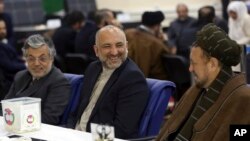President Ashraf Ghani formally dismissed a deputy of Chief Executive Abdullah Abdullah from office Thursday in a move that seems to have heightened political tensions at a critical time for the country.
Ghani's office said Haji Mohammad Mohaqiq was dismissed based on an article of the constitution that gives the president authority to hire or fire government officials.
However, Abdullah termed the removal "against the political agreement" that led to the formation of the National Unity Government in 2014.
"In this sensitive historic phase, any one-sided decision against the aspiration of the National Unity Government will weaken the spirit of the NUG, joint cooperation, and will provoke instability," the statement read.
Upcoming elections
Afghanistan is preparing for a presidential election later this year, and a U.S. team's negotiations with the Afghan Taliban to find a road map to end the 18-year-long war seem to be getting serious.
The Taliban has so far refused to directly negotiate with the Kabul regime. The U.S. and other regional countries are pressuring the group to engage with the current Afghan administration.A rift in the Unity Government can further complicate the situation.
The NUG was formed after the last presidential elections in 2014 resulted in a serious political crisis. Both Ghani and Abdullah claimed victory and alleged massive fraud in vote counting. Former U.S. Secretary of State John Kerry helped negotiate a deal between the two sides.
Political bickering
Under the terms of agreement, electoral and constitutional reforms were supposed to lead to the chief executive post being formalized into the post of a prime minister. However, continuous political bickering led to delays in the process. The Afghan parliament held its elections in 2018 — three years after its constitutional term had ended — after repeated renewals through presidential decrees.
Mohaqiq is running in the upcoming election as the second vice president of presidential candidate Mohammad Hanif Atmar. Ghani and Abdullah have filed nomination papers.
While the president has constitutional authority to hire and fire officials, said Subhan Misbah, a deputy at the Lawyers Union of Afghanistan, the entire office of the CEO, including the chief executive and his two deputies, was beyond the scope of the Afghan constitution and technically "illegal."
The matter, he said, was not legal, but political, and needed to be resolved politically between Ghani and Abdullah. Since someone was "illegally" appointed, it was a moot point to discuss whether he could be legally dismissed.
Muhaqiq's office said he would hold a press conference on this issue on Friday.





